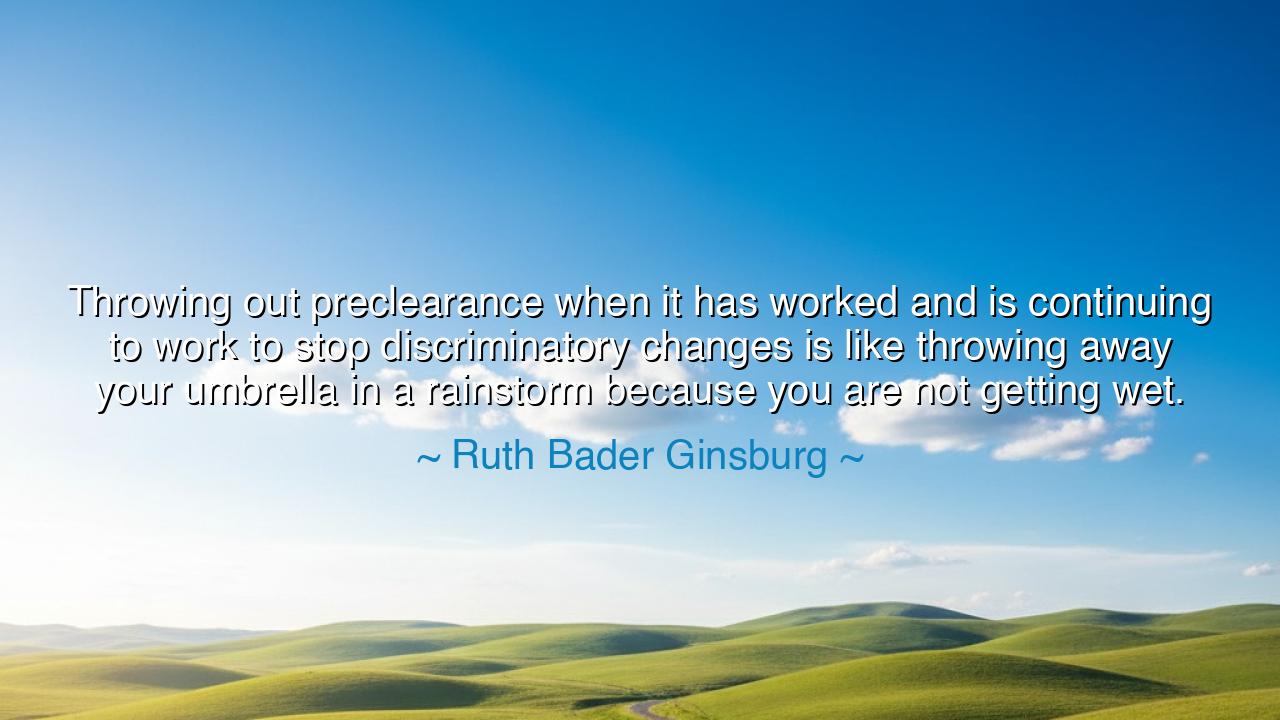
Throwing out preclearance when it has worked and is continuing
Throwing out preclearance when it has worked and is continuing to work to stop discriminatory changes is like throwing away your umbrella in a rainstorm because you are not getting wet.






The guardian of justice, Ruth Bader Ginsburg, once declared with piercing wisdom: “Throwing out preclearance when it has worked and is continuing to work to stop discriminatory changes is like throwing away your umbrella in a rainstorm because you are not getting wet.” In this vivid image she unveiled the folly of abandoning protection while danger still surrounds. For the umbrella is not unnecessary because one is dry—it is the very reason one is shielded from the storm.
The preclearance she spoke of was the safeguard of the Voting Rights Act, a shield forged to protect the people from the poison of discrimination. It demanded that states with histories of injustice seek approval before altering their election laws, ensuring that the rights of the vulnerable were not stripped away in silence. To cast it aside, she warned, was to forget the storms of the past, as though the rains of injustice had ceased simply because the umbrella had been held high.
Her words carry the weight of eternal truth: protections must not be abandoned when they succeed, for their very success proves their necessity. The farmer does not cast away his plow because his fields are fruitful, nor the soldier his armor because the battle seems quiet. So too, a nation must not discard the instruments of justice simply because their power has preserved peace.
Ginsburg’s metaphor is a rebuke to complacency, that ancient enemy of progress. For when societies grow weary of vigilance, the old evils creep back like weeds through untended soil. The rains of discrimination are never gone, only waiting for the careless moment when the shield is lowered. In her warning, she reminds us that liberty is not a trophy to be won once, but a trust to be guarded always.
So let this wisdom endure: hold fast to the umbrella of justice, even when skies seem clear. For rights once secured can be lost, and protections once cast aside are not easily restored. Ginsburg’s teaching is not only for her time, but for all ages—that the work of freedom is endless vigilance, and that the shield of justice must never be thrown away while storms still threaten.






MGMinh Gia
Ruth Bader Ginsburg’s comparison of preclearance to an umbrella in a rainstorm is a brilliant way of demonstrating the importance of safeguarding measures. It’s so easy to overlook protections when we’re not directly impacted by them. But what happens when we take them away? Is it worth waiting until the storm hits to realize we need that umbrella again? How do we stay proactive and avoid dismantling critical safeguards?
NDMinh Ngoc Dang
Ginsburg’s words really emphasize the importance of keeping protective systems in place, even if we’re not facing immediate threats. It makes me think about how often we take things like voter protections for granted. How do we prevent ourselves from complacency, thinking that everything is fine now, only to realize later that we’ve lost the protections that kept things in check? When is the right time to fight to preserve what works?
HPNguyen Hieu Phong
This quote by Ginsburg is a powerful reminder of why we need to be vigilant with our rights and protections, even when it seems like we don’t need them anymore. It’s so easy to let down our guard once we feel safe. But if we discard things like preclearance just because the storm seems distant, we might regret it when the winds pick up. How can we better appreciate the importance of these safeguards, even in times of peace?
GGullit
I love how Ruth Bader Ginsburg uses this simple analogy to argue for maintaining protective measures like preclearance. It’s such a clear and relatable way to remind us that just because something is not immediately needed doesn’t mean it’s not valuable. How do we ensure that we don’t overlook or weaken critical protections in the name of convenience or complacency, especially when history shows us the consequences of doing so?
CHNguyen chu hoang
This is such a strong and thought-provoking quote. Ginsburg’s metaphor about the umbrella speaks to the importance of precautionary measures, even when we may feel comfortable at the moment. It makes me question—how often do we dismantle protections, thinking they’re no longer needed, just because we’re not currently experiencing the worst consequences? What happens when those protections are gone, and the storm finally arrives?